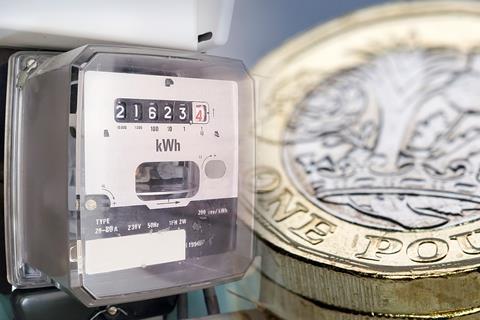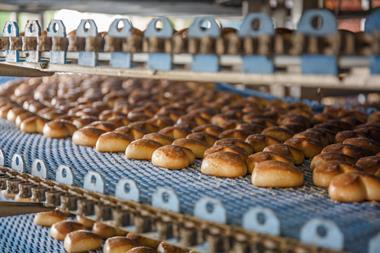
Bakery trade bodies have criticised the energy bills discount scheme announced by the government this week and called for further clarity on how it will operate.
The scheme, which comes into force from April, will mean all eligible non-domestic energy users will receive a discount on high energy bills. Businesses in sectors with particularly high levels of energy use, which includes baked goods manufacturers, will be able to apply to receive a higher level of discount under the Energy and Trade Intensive Industries (ETII) scheme. For full details see our previous story.
The Treasury said the new scheme strikes a balance between supporting businesses over the next 12 months and limiting taxpayer’s exposure to volatile energy markets.
“We are launching the new Energy Bills Discount Scheme, giving businesses the certainty they need to plan ahead,” said Chancellor of the Exchequer Jeremy Hunt this week.
However, the announcement of the new measure has raised concerns about it offering less support to businesses than the current Energy Bill Relief Scheme and has raised questions over how the discounts will be applied.
Here we round up the responses of bakery trade groups and other food and drink associations.
Scottish Bakers
Alasdair Smith, chief executive officer
As we understand it, today’s [9 December] update indicates that higher users of energy who are typically less able to pass on the costs will qualify for a higher level of relief than most other sectors and the list of business sectors eligible for the higher-level support includes bakeries, which is good news.
But this move offers little or no comfort and so could still spell disaster for many small businesses who have no slack left to soak up or indeed pass on ever increasing energy bills. The relief offered will both lead to increased energy costs for these businesses while leaving them dangerously exposed to fluctuating wholesale energy prices.
We fear that this burden of pressure, in addition to the inevitable higher energy costs will make some businesses consider their future.
We are further concerned about the lack of detail in how these rebates will be applied. Coupled with a general lack of transparency on wholesale prices from suppliers, this will bring further instability to businesses as they try to plan their budgets for the year ahead with little certainty. We fear that this burden of pressure, in addition to the inevitable higher energy costs will make some businesses consider their future.
Scottish Bakers members continue to share their concerns that the soaring cost of energy and other input costs – including all major ingredients that go into our nation’s daily bread, savoury snacks and sweet treats – was threatening their long-term survival.
As a vital part of the country’s food chain, and where energy represents a disproportionately high percentage of input costs, Scottish Bakers once again call for this relief to be extended to small and medium sized businesses to secure the long-term future of the trade.
Federation of Bakers
Andrew Pyne, chief executive
This government announcement finally brings some much-needed clarity for the bakery industry. Whilst we understand change was needed to the existing energy support system, it’s pleasing to see government has listened to us and included the bakery sector as a recognised energy intense critical industry under the ETII scheme with the higher level of support. But it still means the bakery sector energy costs will increase from March, and we also have concerns for those companies in the bakery supply chain who we rely upon, who will face significantly higher energy costs. There is still some detail and clarity we are seeking in relation to this announcement.
Like many, the bakery industry is currently navigating cost increases across multiple areas of their businesses including the cost of wheat, fuel and transport price pressures and securing and retaining staff in a period of a tight labour market, all whilst attempting to absorb these price hikes.
As bakers continue to strive to help affordably feed the nation during these difficult times, these increased cost pressures from energy will inevitably have to be passed on to consumers come the spring.
Real Bread Campaign
Chris Young, coordinator
Over the past couple of years, we’ve seen a number of small bakeries and flour mills being forced to close due to the multiple whammy of Brexit, successive lockdowns and huge hikes in the price of energy and ingredients. The government pulling the rug like this will see many more going under. How will small bakery owners being forced to put their prices up, let alone those having to make people redundant, help anyone with their cost of living? How economically sustainable will an increase in former bakers and bakery owners claiming benefits be?
Craft Bakers Association
The CBA is seeking more information on the scheme and told British Baker:
Without further clarity, the Craft Bakers Association are unable to comment on behalf of the industry and its members regarding the January statement announced today. The CBA continue to search for confirmation on what the support will mean for its members and bakery businesses going forward.
UKHospitality
Kate Nicholls, chief executive
While I’m relieved the Chancellor has listened to UKHospitality’s concerns and extended the scheme as a whole, the absence of a sector-specific package that helps vulnerable sectors like hospitality will still result in higher bills. Our analysis shows the new, lower level of support will see a total £4.5 billion hike in bills for the sector compared to the previous scheme.
This will simply be unsustainable for many. With no further, dedicated support for a vulnerable sector like hospitality, I’d urge the government to consider other measures it can take to help the sector. One measure in particular that would make a significant difference would be increasing the business rates relief cap. For those suppliers to hospitality in the wider food and drink sector that have received additional support, we expect them to support the sector accordingly in their pricing.
We must see a concerted change in behaviour by energy suppliers, who have been unfairly treating businesses
Now we have some clarity on the future of energy support, we must see a concerted change in behaviour by energy suppliers, who have been unfairly treating businesses with outlandish quotes and unjustifiable demands for enormous deposits or pre-payments. Government must act swiftly if this is not forthcoming.
This scheme is a significant investment from the government and energy suppliers should not be using that as an excuse to hike up prices.
This is an extremely challenging period for the UK’s hospitality sector, which is so important to the economy and communities, and it’s essential the sector gets through it as best it can. If it does, I’m confident we can reach a situation where hospitality will return to generating economic growth, delivering hundreds of thousands of jobs, and investing in Britain’s high street and communities. This is all while it contributes billions to Treasury revenues.
British Retail Consortium
Tom Ironside, director of business & regulation
While we welcome the decision to continue to cover retail under the new energy scheme, the substantial reduction in support will do little to alleviate cost-pressures facing retailers. This is at a time when retailers continue to face strong headwinds which are leading to higher prices at the till. Nonetheless, retailers remain committed to keeping prices affordable as possible for all their customers during this cost-of-living crisis.
Food and Drink Federation
Karen Betts, chief executive
The government’s announcement of continued support for food and drink businesses with their energy bills is welcome.
Manufacturers are under a great deal of pressure as they try to keep their heads above water while absorbing very high and volatile energy costs in order to keep the cost of everyday food and drink as low as possible for shoppers.
This support recognises the criticality of the food and drink supply chain and that our businesses use constant levels of energy year-round, and it should help slow record levels of food and drink inflation. What’s important is we remain in close dialogue with government as the situation continues to evolve throughout the year for which the support is being provided, given how fast-moving the energy situation has become.
































No comments yet